Unit6 SectionA Grammar Focus-3c)课件(新目标七年级上册Unit 6 Do you like bananas?)
文档属性
| 名称 | Unit6 SectionA Grammar Focus-3c)课件(新目标七年级上册Unit 6 Do you like bananas?) |

|
|
| 格式 | pptx | ||
| 文件大小 | 1.2MB | ||
| 资源类型 | 试卷 | ||
| 版本资源 | 人教新目标(Go for it)版 | ||
| 科目 | 英语 | ||
| 更新时间 | 2023-10-26 08:31:30 | ||
图片预览

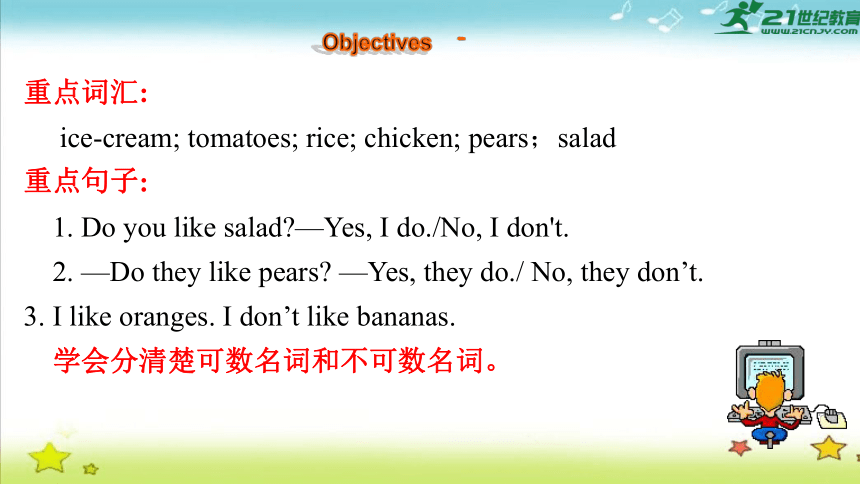

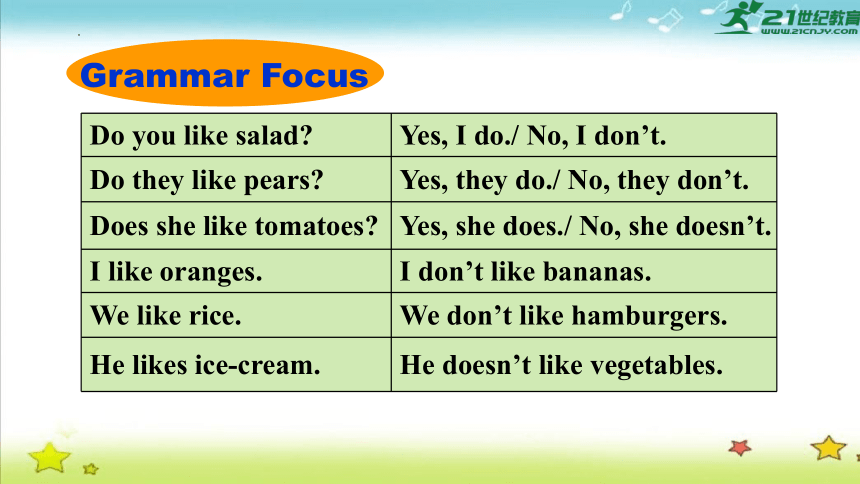
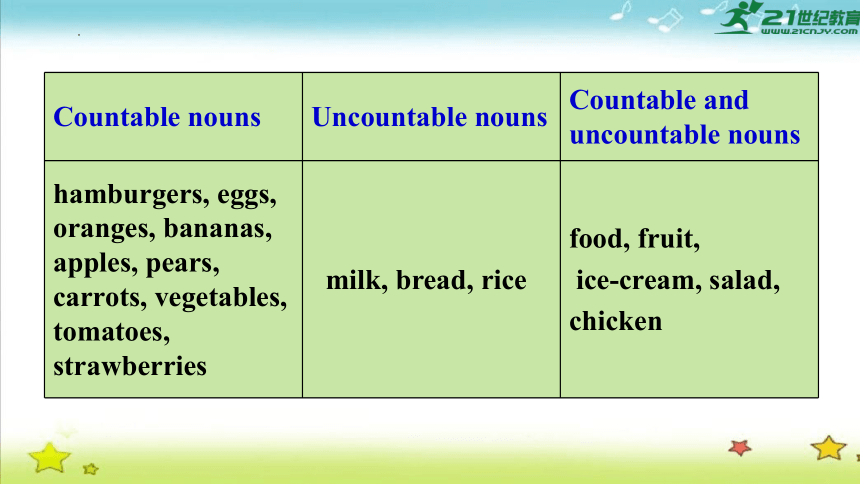
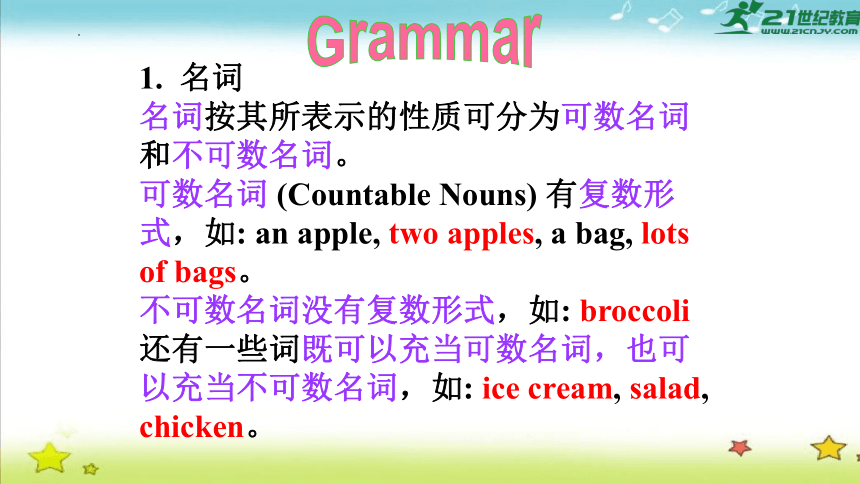
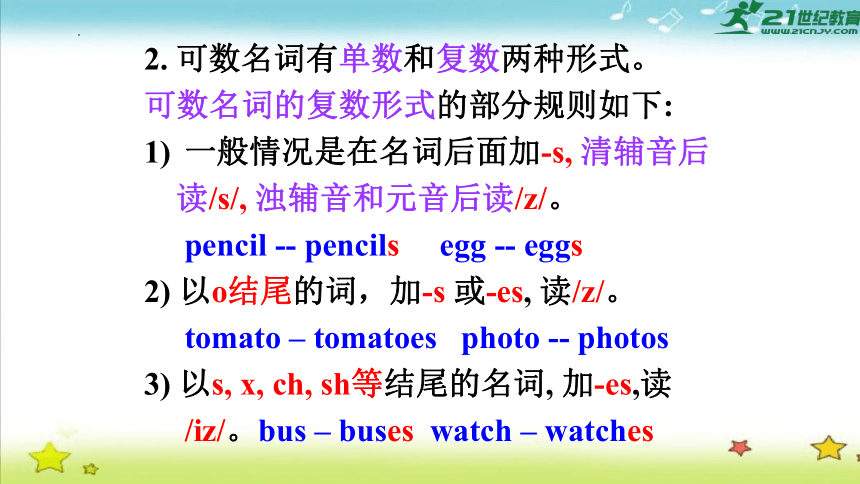


文档简介
(共20张PPT)
Grammar Focus
Unit 6 Do you like bananas
Objectives
重点词汇:
ice-cream; tomatoes; rice; chicken; pears;salad
重点句子:
1. Do you like salad —Yes, I do./No, I don't.
2. —Do they like pears —Yes, they do./ No, they don’t.
3. I like oranges. I don’t like bananas.
学会分清楚可数名词和不可数名词。
Objectives
rice
egg
carrot
chicken
so
大米;米饭
蛋;鸡蛋
胡萝卜
鸡肉
(引出评论或问题)那么
New words
Do you like salad Yes, I do./ No, I don’t.
Do they like pears Yes, they do./ No, they don’t.
Does she like tomatoes Yes, she does./ No, she doesn’t.
I like oranges. I don’t like bananas.
We like rice. We don’t like hamburgers.
He likes ice-cream. He doesn’t like vegetables.
Grammar Focus
Countable nouns Uncountable nouns Countable and uncountable nouns
hamburgers, eggs, oranges, bananas, apples, pears, carrots, vegetables, tomatoes, strawberries milk, bread, rice food, fruit,
ice-cream, salad,
chicken
名词
名词按其所表示的性质可分为可数名词
和不可数名词。
可数名词 (Countable Nouns) 有复数形
式,如: an apple, two apples, a bag, lots
of bags。
不可数名词没有复数形式,如: broccoli
还有一些词既可以充当可数名词,也可
以充当不可数名词,如: ice cream, salad,
chicken。
Grammar
2. 可数名词有单数和复数两种形式。
可数名词的复数形式的部分规则如下:
一般情况是在名词后面加-s, 清辅音后
读/s/, 浊辅音和元音后读/z/。
pencil -- pencils egg -- eggs
2) 以o结尾的词,加-s 或-es, 读/z/。
tomato – tomatoes photo -- photos
3) 以s, x, ch, sh等结尾的名词, 加-es,读
/iz/。bus – buses watch – watches
4) 以ce, se, ze, (d) ge等结尾的词, 加-s, 读
/iz/。orange – oranges price – prices
5) 以辅音字母+y结尾的名词,把y变成
i,再加 –es。 strawberry -- strawberries
6) 以元音字母+y结尾的名词,后面直接加-s,day—days boy—boys
2. 可数名词复数的变化规则
构成方式 例 词
一般在词尾加-s
以s, x, sh, ch结尾的加-es
以“辅音字母+y”结尾的词, 把y变为i, 再加-es
以o结尾的可数名词
以f或fe结尾的词, 一般把f或fe改为v, 再加-es
desk→ desks
brush→ brushes watch→ watches
story→ stories
strawberry→ strawberries
有生命的加
-es
potato→ potatoes
tomato→ tomatoes
无生命的加-s
piano→ pianos
wolf→ wolves wife→ wives
少数可数名词变复数是不规则的,
如man → men, woman → women,
child → children, sheep → sheep,
foot → feet, tooth → teeth,
mouse → mice, Chinese → Chinese等。
动词like的一般现在时用法
肯定句 主语+like(s)+其他. I like oranges. 我喜欢橙子。
She likes pears. 她喜欢梨。
否定句 主语+ don’t/ doesn’t like +其他. I don’t like oranges. 我不喜欢橙子。
She doesn’t like pears. 她不喜欢梨。
一般疑问句及其回答 Do(es)+主语+like+其他? 肯定回答: Yes,主语+do(es). 否定回答: No, 主语+don’t/ doesn’t. —Do you like oranges 你喜欢橙子吗?
—Yes, I do./ No, I don’t.
是的, 我喜欢。/不, 我不喜欢。
—Does she like pears 她喜欢梨吗?
—Yes, she does./ No, she doesn’t.
是的,她喜欢。/ 不, 她不喜欢
3a
Underline the correct words in the brackets.
1. I like fruit, but I (don’t/doesn’t) like vegetables.
2. She (like/likes) bread, but she (doesn’t/don’t) like salad.
3. He (like/likes) bananas, but he (don’t/doesn’t) like oranges.
4. We (likes/like) hamburgers, but we don’t (like/likes)
chicken.
5. They (likes/like) pears, but they (don’t/doesn’t) like
strawberries.
3b
Number these sentences[1-4]to make a conversation.
So, let’s get salad. Yes, I do.
Do you like salad OK.
1
2
3
4
3c
Ask your classmates about the food in the chart. Find out what they like and don’t like.
Food Likes Doesn’t like
Liu Li Zhao Jun
ice-cream
hamburger
orange
milk
Food Likes Doesn’t like
salad
strawberry
tomato
banana
根据句意和汉语提示写单词。
My sister eats an ___ (鸡蛋) every
morning.
2. My mother likes eating ______ (苹果).
3. We have some __________(蔬菜) every day.
4. Do you like eating ________(鸡肉)
5. Let’s have some _____ (食物).
egg
apples
vegetables
chicken
food
Ⅰ. 单项选择
1. I milk and my sister salad.
A. like; like B. likes; likes
C. like; likes D. likes; like
2. he pears
A. Does; like B. Does; likes
C. Do; like D. Do; likes
3. I like ice-cream and he like eggs.
A. don’t; don’t B. don’t; doesn’t
C. doesn’t; don’t D. doesn’t; doesn’t
4. I like and Liu Li likes .
A. tomato; strawberry B. tomatos; strawberrys
C. tomatoes; strawberrys D. tomatoes; strawberries
5. —I think ping-pong is very interesting.
— , let’s play ping-pong this afternoon.
A. But B. So
C. Because D. Such
Ⅱ. 句型转换
1. I like bananas. (改为否定句)
I bananas.
2. He likes rice. (改为否定句)
He rice.
don’t like
doesn’t like
3. Does she have any apples (作否定回答)
, she .
4. They like ice-cream. (改为一般疑问句)
they ice-cream
5. My parents like bread. They don’t like milk. (合并句子)
My parents like bread don’t like milk.
but they
Do
like
No
doesn’t
III. 按要求写出下列单词的正确形式。
1. watch(复数)____________
2. carrot(复数)____________
3. sound(第三人称单数)____________
4. tomato(复数)____________
5. I(宾格)____________
6. it is(缩写)____________
watches
carrots
sounds
tomatoes
me
it’s
Grammar Focus
Unit 6 Do you like bananas
Objectives
重点词汇:
ice-cream; tomatoes; rice; chicken; pears;salad
重点句子:
1. Do you like salad —Yes, I do./No, I don't.
2. —Do they like pears —Yes, they do./ No, they don’t.
3. I like oranges. I don’t like bananas.
学会分清楚可数名词和不可数名词。
Objectives
rice
egg
carrot
chicken
so
大米;米饭
蛋;鸡蛋
胡萝卜
鸡肉
(引出评论或问题)那么
New words
Do you like salad Yes, I do./ No, I don’t.
Do they like pears Yes, they do./ No, they don’t.
Does she like tomatoes Yes, she does./ No, she doesn’t.
I like oranges. I don’t like bananas.
We like rice. We don’t like hamburgers.
He likes ice-cream. He doesn’t like vegetables.
Grammar Focus
Countable nouns Uncountable nouns Countable and uncountable nouns
hamburgers, eggs, oranges, bananas, apples, pears, carrots, vegetables, tomatoes, strawberries milk, bread, rice food, fruit,
ice-cream, salad,
chicken
名词
名词按其所表示的性质可分为可数名词
和不可数名词。
可数名词 (Countable Nouns) 有复数形
式,如: an apple, two apples, a bag, lots
of bags。
不可数名词没有复数形式,如: broccoli
还有一些词既可以充当可数名词,也可
以充当不可数名词,如: ice cream, salad,
chicken。
Grammar
2. 可数名词有单数和复数两种形式。
可数名词的复数形式的部分规则如下:
一般情况是在名词后面加-s, 清辅音后
读/s/, 浊辅音和元音后读/z/。
pencil -- pencils egg -- eggs
2) 以o结尾的词,加-s 或-es, 读/z/。
tomato – tomatoes photo -- photos
3) 以s, x, ch, sh等结尾的名词, 加-es,读
/iz/。bus – buses watch – watches
4) 以ce, se, ze, (d) ge等结尾的词, 加-s, 读
/iz/。orange – oranges price – prices
5) 以辅音字母+y结尾的名词,把y变成
i,再加 –es。 strawberry -- strawberries
6) 以元音字母+y结尾的名词,后面直接加-s,day—days boy—boys
2. 可数名词复数的变化规则
构成方式 例 词
一般在词尾加-s
以s, x, sh, ch结尾的加-es
以“辅音字母+y”结尾的词, 把y变为i, 再加-es
以o结尾的可数名词
以f或fe结尾的词, 一般把f或fe改为v, 再加-es
desk→ desks
brush→ brushes watch→ watches
story→ stories
strawberry→ strawberries
有生命的加
-es
potato→ potatoes
tomato→ tomatoes
无生命的加-s
piano→ pianos
wolf→ wolves wife→ wives
少数可数名词变复数是不规则的,
如man → men, woman → women,
child → children, sheep → sheep,
foot → feet, tooth → teeth,
mouse → mice, Chinese → Chinese等。
动词like的一般现在时用法
肯定句 主语+like(s)+其他. I like oranges. 我喜欢橙子。
She likes pears. 她喜欢梨。
否定句 主语+ don’t/ doesn’t like +其他. I don’t like oranges. 我不喜欢橙子。
She doesn’t like pears. 她不喜欢梨。
一般疑问句及其回答 Do(es)+主语+like+其他? 肯定回答: Yes,主语+do(es). 否定回答: No, 主语+don’t/ doesn’t. —Do you like oranges 你喜欢橙子吗?
—Yes, I do./ No, I don’t.
是的, 我喜欢。/不, 我不喜欢。
—Does she like pears 她喜欢梨吗?
—Yes, she does./ No, she doesn’t.
是的,她喜欢。/ 不, 她不喜欢
3a
Underline the correct words in the brackets.
1. I like fruit, but I (don’t/doesn’t) like vegetables.
2. She (like/likes) bread, but she (doesn’t/don’t) like salad.
3. He (like/likes) bananas, but he (don’t/doesn’t) like oranges.
4. We (likes/like) hamburgers, but we don’t (like/likes)
chicken.
5. They (likes/like) pears, but they (don’t/doesn’t) like
strawberries.
3b
Number these sentences[1-4]to make a conversation.
So, let’s get salad. Yes, I do.
Do you like salad OK.
1
2
3
4
3c
Ask your classmates about the food in the chart. Find out what they like and don’t like.
Food Likes Doesn’t like
Liu Li Zhao Jun
ice-cream
hamburger
orange
milk
Food Likes Doesn’t like
salad
strawberry
tomato
banana
根据句意和汉语提示写单词。
My sister eats an ___ (鸡蛋) every
morning.
2. My mother likes eating ______ (苹果).
3. We have some __________(蔬菜) every day.
4. Do you like eating ________(鸡肉)
5. Let’s have some _____ (食物).
egg
apples
vegetables
chicken
food
Ⅰ. 单项选择
1. I milk and my sister salad.
A. like; like B. likes; likes
C. like; likes D. likes; like
2. he pears
A. Does; like B. Does; likes
C. Do; like D. Do; likes
3. I like ice-cream and he like eggs.
A. don’t; don’t B. don’t; doesn’t
C. doesn’t; don’t D. doesn’t; doesn’t
4. I like and Liu Li likes .
A. tomato; strawberry B. tomatos; strawberrys
C. tomatoes; strawberrys D. tomatoes; strawberries
5. —I think ping-pong is very interesting.
— , let’s play ping-pong this afternoon.
A. But B. So
C. Because D. Such
Ⅱ. 句型转换
1. I like bananas. (改为否定句)
I bananas.
2. He likes rice. (改为否定句)
He rice.
don’t like
doesn’t like
3. Does she have any apples (作否定回答)
, she .
4. They like ice-cream. (改为一般疑问句)
they ice-cream
5. My parents like bread. They don’t like milk. (合并句子)
My parents like bread don’t like milk.
but they
Do
like
No
doesn’t
III. 按要求写出下列单词的正确形式。
1. watch(复数)____________
2. carrot(复数)____________
3. sound(第三人称单数)____________
4. tomato(复数)____________
5. I(宾格)____________
6. it is(缩写)____________
watches
carrots
sounds
tomatoes
me
it’s
同课章节目录
- starters 预备篇(2012秋审查)
- Unit 1 Good morning !
- Unit 2 What’s this in English?
- Unit 3 What color is it ?
- Unit 1 My name's Gina.
- Section A
- Section B
- Unit 2 This is my sister.
- Section A
- Section B
- Unit 3 Is this your pencil?
- Section A
- Section B
- Unit 4 Where's my schoolbag?
- Section A
- Section B
- Unit 5 Do you have a soccer ball?
- Section A
- Section B
- Unit 6 Do you like bananas?
- Section A
- Section B
- Unit 7 How much are these socks?
- Section A
- Section B
- Unit 8 When is your birthday?
- Section A
- Section B
- Unit 9 My favorite subject is science.
- Section A
- Section B
